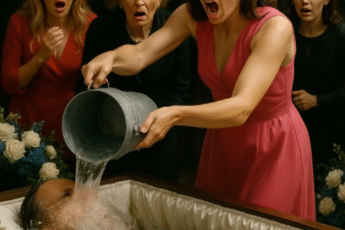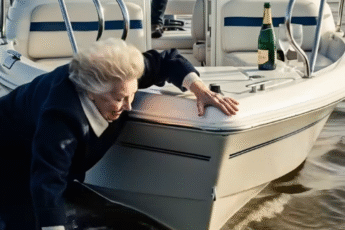The phone’s shrill cry cut through John Hail’s dreamless sleep like a blade. His calloused hand fumbled across the nightstand, knocking over an empty beer bottle before finding the device. The digital clock glowed 12:43 a.m. in harsh red numbers.
“Hello?” His voice was a gravelly rasp, a product of too many cigarettes and too many nights spent alone.
Static crackled through the line, then a voice so small and weak it barely registered as human. “Uncle John?”
John’s spine straightened. He knew that voice. Lucy, his brother’s little girl. “Lucy? Sweetheart, what’s wrong? Where’s your mom?”
“Uncle… I’m hungry.” The words came out broken, as if she were fighting to speak. “Mommy’s gone. I… I can’t move. Please.”
The line went dead. John stared at the phone, his heart hammering against his ribs. Two years. Two years since his brother, Elias, had died in that scaffolding collapse, and John had barely seen his niece. Jean, Elias’s widow, had made sure of that, always making excuses, always keeping the girl away.
He threw on the first clothes he could find—jeans, work boots, a flannel shirt that still smelled of sawdust. His keys jangled as he snatched them from the dresser. The drive across town should have taken fifteen minutes; John made it in eight, his pickup truck roaring through empty streets, ignoring red lights. His knuckles were white on the steering wheel, Elias’s voice echoing in his memory.
“Promise me, John. If something happens to me, you’ll watch out for Lucy. Promise me.”
John had promised. Then he’d failed. He’d let grief swallow him whole, drowning himself in work and beer and the kind of corrosive anger that eats a man from the inside out. While he’d been wallowing, Lucy had been… he didn’t want to think about what Lucy had been enduring.
The house was a portrait of neglect. The yard was a jungle of weeds, newspapers piled on the porch like forgotten memories. He pounded on the locked front door. “Lucy! It’s Uncle John!” Nothing. He circled the house, testing windows. Everything was sealed tight, except for one above the kitchen, cracked open just enough. Twenty years in construction had made him a climber. He hauled himself up the side of the house and squeezed through the opening into what used to be Elias’s bedroom.
The smell hit him first. Stale alcohol, sour milk, and something else, something rotten and viscerally wrong that made his stomach clench. He used his phone’s flashlight to navigate the disaster. Empty bottles littered every surface. Dirty clothes were piled in corners. Dishes were stacked so high in the sink they threatened to topple.
A weak sound came from the living room. John followed it, his boots crunching on broken glass. Lucy lay on the floor, curled up next to the couch like a discarded doll. She was so thin he could see the outline of her ribs through her dirty t-shirt. Her face was pale, almost gray, her lips cracked and dry.
“Jesus Christ,” John whispered, dropping to his knees beside her. His hands shook as he touched her face. Her skin was cold.
Her eyes, Elias’s eyes, fluttered open. They were deep brown and gentle, but hollowed out by a darkness no five-year-old should ever know. “Uncle John,” she whispered. “You came.”
“Of course I came.” He gathered her into his arms, alarmed by how little she weighed. She felt like nothing more than bones wrapped in skin. “When’s the last time you ate?”
“I don’t know. Mommy said there wasn’t any food. She said I was being too expensive.”
John’s jaw clenched so hard his teeth ached. He spotted a recent pizza box on the coffee table, next to a half-empty bottle of wine and an open makeup compact. “Where is she, Lucy? Where’s your mom?”
“She went out with a man,” Lucy’s voice was barely audible. “She said she might not come back. She said I had to stay quiet or… or she’d make me disappear, like Daddy did.”
Before John could respond, the front door slammed open. “What the hell do you think you’re doing in my house?”
Jean Kaine stood in the doorway, silhouetted against the streetlight. She wore a tight black dress that cost more than John made in a week, her makeup perfect, her hair styled in loose curls. She smelled of expensive perfume and cigarettes.
John stood slowly, Lucy still cradled in his arms. “I got a call from your daughter. She was starving.”
“She’s fine,” Jean said, flipping on the lights to reveal the full squalor of the house. “She’s just being dramatic.” She barely glanced at the child in his arms, her eyes narrowing with a familiar hatred. “You broke into my house. I could have you arrested.”
“Good. Call the cops,” John shot back. “Let them see how you’ve been taking care of her.”
“Look at her,” he said, turning so Jean was forced to see Lucy’s pale, sunken face. “Look at your daughter and tell me she’s fine.”
“Maybe if your precious brother hadn’t gotten himself killed, we wouldn’t be in this mess,” she sneered.
John felt Lucy flinch, pressing her face against his chest to make herself smaller.
“Don’t talk about Elias in front of her.”
“I’ll talk about whatever I want in my own house,” Jean moved closer, the smell of alcohol thick on her breath. “And I’ll raise my daughter however I see fit.”
“She called me,” John said, his voice dangerously low. “She was alone, hungry, and scared.”
“She’s a liar,” Jean spat, reaching for Lucy with her manicured nails extended like claws. “Kids lie to get attention. Come here, Lucy. Tell Uncle John you were just pretending.”
Lucy shrank back, her small hands gripping John’s shirt. “No, Mommy, please don’t.” The raw fear in her voice cut John to the core.
“I’m taking her to the hospital,” he said, stepping back.
“Like hell you are!” Jean’s voice rose to a shriek. “She’s my daughter! If you walk out that door with her, I’ll tell the police you kidnapped her! I’ll tell them you assaulted me!”
John met her gaze. “Tell them whatever you want,” he said, and walked past her out the door. Behind him, she screamed a torrent of threats and curses into the night as neighbors’ lights began to flick on. Let them look. Let them see what Jean Kaine really was.
At the emergency room, Dr. Patricia Gomez, a woman with kind eyes and gentle hands, confirmed John’s worst fears.
“She’s severely malnourished,” Dr. Gomez said, her voice grave as she checked Lucy’s vitals. “Dehydrated. I can see evidence of old bruising on her arms and back. This didn’t happen overnight.” She made a note on her clipboard. “I’m going to need to contact Child Protective Services. It’s the law.”
John’s stomach dropped. He had known this was coming, but the reality of it was a punch to the gut. The system. The bureaucracy. While he had been lost in his own grief, that same system had failed to see a little girl wasting away.
“I’m her uncle,” he said, his voice hoarse. “Her father was my brother.”
“And her mother?”
John thought of Jean in her expensive dress, smelling of wine while her daughter starved. “At home,” he said. “She didn’t think Lucy needed medical attention.”
Dr. Gomez’s expression hardened. “Lucy will need to stay overnight for observation. You can stay with her if you’d like.”
John looked at his niece, watching him with those big, solemn eyes—Elias’s eyes. She had been abandoned by everyone. Her mother, the system, even him. Not anymore.
“I’m not going anywhere,” he said.
Later, as Lucy slept, hooked up to an IV, John sat by her bed and let the guilt wash over him. Elias had been the good one, the optimist who saw potential in people who didn’t deserve it. He’d married Jean, convinced he could save her from her demons. John had never liked her, had seen the selfishness and volatility, but he had kept his mouth shut for his brother’s sake.
Elias had worked dangerous jobs, double shifts, all to save money for a better life for his family. The scaffolding collapse was ruled a tragic accident, but John had always wondered. He’d been the one to identify the body, to tell a three-year-old Lucy that her daddy was never coming home. Jean had put on a spectacular show of grief at the funeral, only to revert to her old habits of drinking and partying within a week. John had tried to stay involved, but Jean had pushed him away, accusing him of trying to replace Elias, threatening him with a restraining order. So he had retreated, telling himself Lucy was better off without his bitterness. He had been a fool.
“Uncle John?” Lucy’s voice was a whisper in the dark room.
“I’m here, sweetheart.”
“Are you going to leave, too?”
He reached over and took her small, cool hand in his. “No, Lucy. I’m not going anywhere. I promise.”
“Mommy says promises don’t mean anything. She says Daddy promised to always take care of us, and then he went away.”
John’s chest tightened. “Your daddy didn’t want to go away. He loved you more than anything.” He looked at her small, hopeful face. She deserved protection. She deserved a chance. “Sometimes bad things happen. But I can control this. I can stay.”
“You can?”
“I can,” he said, making a promise not just to her, but to his brother’s memory. “And I will.”
The next morning brought a parade of officials. A CPS caseworker named Mrs. Rodriguez, a woman with the tired eyes of someone who had seen the worst of humanity, explained the process. An investigation. A home inspection. Background checks. And in the meantime, Lucy would be placed in temporary custody.
“Temporary custody?”
“Foster care,” she clarified, her expression softening slightly. “Until we can resolve the situation with her mother or approve you as a kinship caregiver. It could take a few weeks.”
A few weeks. He thought of Lucy, alone in a stranger’s house, feeling abandoned yet again. But he had learned patience in construction. You couldn’t rush a foundation, or the whole building would collapse.
“Whatever you need from me,” he said, “I’ll do it.”
The first custody hearing was a farce. Jean, dressed in a conservative blue blouse, looked like a PTA mom, not a neglectful alcoholic. Her expensive lawyer painted a picture of a grieving, depressed single mother who had made mistakes but loved her daughter dearly.
Judge Patricia Walsh, a stern woman with a reputation for being tough but fair, listened to it all. She acknowledged John’s willingness to step in but emphasized the court’s preference for keeping a child with her mother.
“Temporary custody is awarded to Mrs. Kaine,” the judge announced, her gavel falling like a gunshot. “With strict conditions: parenting classes, regular drug and alcohol testing, and unannounced visits from a caseworker. Mr. Hail will be granted supervised visitation twice weekly.”
As Jean walked past him in the hallway, she turned, a small, triumphant smile on her face. “Face it, John,” she called out, loud enough for everyone to hear. “She’s mine. You’ll never take her.”
He stood on the courthouse steps, watching her drive away, the system having failed his niece once again. But his lawyer’s words echoed in his mind: “We wait. We document everything. If she slips up—and she will—we’ll be ready.”
John wasn’t just going to wait for evidence. He was going to find it.
His investigation began with Clara Dorsy, the seventy-eight-year-old woman who had lived next door to Elias and Jean for fifteen years. Her mind, he discovered, was as sharp as a blade.
“That woman has quite a set of lungs on her,” Clara said over a cup of coffee strong enough to dissolve steel. “She’d leave that little girl alone for hours, sometimes all night. I heard that child crying for hours the night you came to get her. Real distress crying. Jean had left around eight in some man’s car, all dressed up. I called CPS three times, but they said without evidence of immediate danger, there wasn’t much they could do.” She looked at him, her eyes fierce. “Young man, if there’s a chance to help that little girl, you can count on me.”
Next was Luis Moreno, Elias’s best friend and construction partner. Over a beer at a dingy bar, Luis filled in the missing pieces. Elias had known about Jean’s drinking, her binges. He had been saving money to move them, to get her help. He had also, six months before he died, set up Lucy’s survivor benefits to go into a protected account, making Jean sign papers stating the money was exclusively for Lucy’s care.
“I still have his toolbox,” Luis said, his voice thick with emotion. “He kept all his important papers in it.”
In the bottom of that red Craftsman toolbox, John found it: a manila folder with copies of the signed documents, proof that Jean had been systematically misusing the thousands of dollars meant for her daughter.
The final, most damning piece of evidence came from Lucy herself. During a supervised visit, in a moment when the social worker stepped out, she slipped him a folded piece of paper. It was a crayon drawing of a little girl locked in a closet, with the words “mommy says no food” written in shaky letters.
“Last week,” she whispered, her eyes wide with fear. “I was too loud. She put me in the closet and said I couldn’t come out until I learned to be quiet. She forgot about me until the next morning.”
John held the drawing, his hands shaking with a rage so profound it felt like a physical illness. He now had the ammunition he needed. He just had to wait for the right moment to fire.
The second custody hearing was a different battle. John’s new lawyer, Rebecca Martinez, was a shark in a tailored suit. She presented the financial records, Clara’s written statement, and the medical reports with cold, clinical precision. When she called Jean to the stand, her questions were scalpels, dissecting Jean’s narrative of the grieving, struggling mother.
“Mrs. Kaine,” Martinez began, “on the same day your daughter was hospitalized for malnutrition, you spent two hundred and thirty dollars at an upscale restaurant. Can you explain how that was necessary for your daughter’s welfare?”
Jean’s composure crumbled under the relentless assault of facts. She called Lucy a liar. She called Clara senile. She exposed the raw, selfish anger that lurked beneath her carefully constructed façade.
The final piece of evidence was the report from Dr. Sarah Chen, a child psychologist who had evaluated Lucy. “In my professional opinion,” Dr. Chen testified, “Lucy exhibits all the classic signs of ongoing emotional and physical abuse. Her drawings of being locked in dark places are consistent with genuine traumatic experiences.”
Judge Walsh’s decision was swift and absolute. She terminated Jean’s parental rights entirely and awarded full custody to John.
“Mrs. Kaine,” the judge said, her voice heavy with the weight of her twenty years on the bench, “you are fortunate that your daughter survived your neglect.”
As security escorted a screaming, threatening Jean from the courthouse, John felt no triumph, only a profound, weary relief. It was over. Lucy was safe.
That spring, John’s small, quiet house was transformed. He painted Lucy’s room a soft yellow and built shelves for her books and toys. They planted a garden together, filling the small patch of dirt with flowers of every color. The nightmares slowly began to fade, replaced by the sounds of a little girl’s laughter chasing butterflies in the sun. He had kept his promise. He had brought her home.





